“Obey these instructions as a lasting ordinance for you and your descendants. When you enter the land that the Lord will give you as he promised, observe this ceremony. And when your children ask you, ‘What does this ceremony mean to you?’ then tell them, ‘It is the Passover sacrifice to the Lord, who passed over the houses of the Israelites in Egypt and spared our homes when he struck down the Egyptians.'” ~Exodus 12:24-27
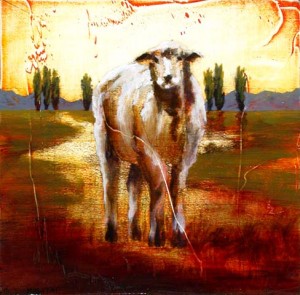 The final dinner Jesus shared with his disciples on the night of his betrayal was a Passover meal. The synoptic gospels all make the explicit claim that this was the Passover. Jesus made preparations and gathered his disciples to “eat the Passover.” Since this last supper has become for the majority of Christians the be-all, end-all paradigm for our own beliefs and practices regarding the Lord’s Supper (for right or wrong), it makes sense to study carefully the Passover context of that last night. I’ve had church leaders on more than one occasion point to the gospel accounts of this last meal to justify their order that we not sing any songs during the Lord’s Supper. After all, the logic goes, the Bible says they sang a song after the meal, not during. Of course, if we’re to follow that logic to its conclusion, we’d be sharing the Lord’s Supper only on Thursdays. Upstairs.
The final dinner Jesus shared with his disciples on the night of his betrayal was a Passover meal. The synoptic gospels all make the explicit claim that this was the Passover. Jesus made preparations and gathered his disciples to “eat the Passover.” Since this last supper has become for the majority of Christians the be-all, end-all paradigm for our own beliefs and practices regarding the Lord’s Supper (for right or wrong), it makes sense to study carefully the Passover context of that last night. I’ve had church leaders on more than one occasion point to the gospel accounts of this last meal to justify their order that we not sing any songs during the Lord’s Supper. After all, the logic goes, the Bible says they sang a song after the meal, not during. Of course, if we’re to follow that logic to its conclusion, we’d be sharing the Lord’s Supper only on Thursdays. Upstairs.
So, yes, let’s look at the Passover context of what was happening around the table on that last night.
As we’ve already noticed in this series, the Jewish Passover meal — all covenant and/or community and/or sacrificial meals for that matter — is a communal celebratory event. As an expression of salvation, it was yet another community meal celebrated following a sacrifice. The Passover, in particular, was a joyous celebration of God’s deliverance of his people from slavery in Egypt.
“Celebrate it as a festival to the Lord — a lasting ordinance!” ~Exodus 12:14
“Celebrate this day as a lasting ordinance for the generations to come.” ~Exodus 12:17
“I am going to celebrate the Passover with my disciples.” ~ Matthew 26:18
The Passover Supper also was a remembrance of that deliverance. By remembrance, we don’t mean a merely intellectual act or emotional recollection. This is a faithful action, a rehearsal, a participation in that deliverance. The Passover liturgies from the Hebrew Scriptures and the Jewish writings from the first century all contain actions and language that help the people around the table to identify with the historic salvation event as if they were present in Egypt and at the Red Sea. 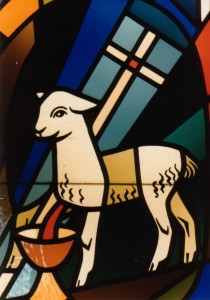
“Celebrate the Passover of the Lord your God because in the month of Abib he brought you out of Egypt.” ~Deuteronomy 16:1
“…so that all the days of your life you may remember the time of your departure from Egypt.” ~Deuteronomy 16:3
“…because you left Egypt in haste.” ~Deuteronomy 16:3
“We cried out to the Lord… the Lord brought us out of Egypt with a mighty hand and an outstretched arm.” ~ Deuteronomy 26:7-8
“Each should celebrate as one who has gone out of Egypt.” ~ Mishna
We also know that as Jesus and his disciples gathered on that last night, their supper together was marked by great joy, praise, and thanksgiving. This was not a dirge or a funeral meal; expressions of joy at this supper were the command of God.
“…with great rejoicing… singing… praise.” ~ 2 Chronicles 30:21-27
“…celebrated with joy… Lord had filled them with joy.” ~ Ezra 6:22
“…your times of rejoicing, your appointed feasts.” ~ Numbers 10:10
 The Passover was also established as an anticipation event. Children of God ate the meal together looking forward to that day when they would be eating it in a much better place, in wonderfully better circumstances. They eat and drink with an eye to the future, focused on an upcoming meal that will surpass the one they share today.
The Passover was also established as an anticipation event. Children of God ate the meal together looking forward to that day when they would be eating it in a much better place, in wonderfully better circumstances. They eat and drink with an eye to the future, focused on an upcoming meal that will surpass the one they share today.
“When you enter the land that the Lord will give you as he promised, observe this ceremony.” ~ Exodus 12:25
If we’re really out to imitate every detail of that Last Supper at our communion times together on Sunday mornings — again, for right or wrong — then why don’t we? As good law-keeping Jews, Jesus and his disciples would have been in a festive spirit that night and engaged all the elements of the evening with great joy. The meal was marked by group identity and interaction. It was a present participation in the past events of God’s salvation. They were singing the psalms, specifically Psalms 113-118, before, during, and after the supper.
I would recommend singing songs of salvation, songs of praise for God’s mighty acts, before, during, and after our communion meals together. I would suggest swapping salvation stories around the table. I once was ______, but now I’m ________. Ask each other the questions: from what have we been delivered? From what to what have we passed? Who took our place that day? Do it together in the aisles or along the walls in your worship center. Huddle up around your pews. Allow the children to ask the questions: Why do we do this? And then share the story: because the Lord our God delivered us by the Passover Lamb. And then hug each other and sing another song.
Peace,
Allan


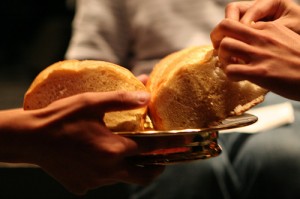
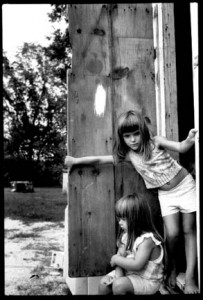

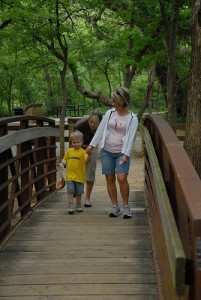

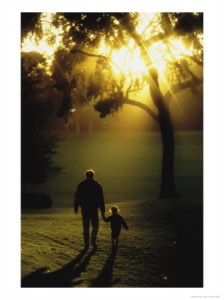


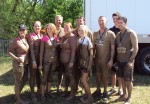
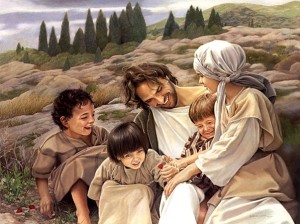
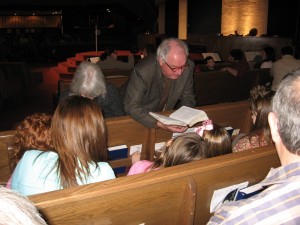


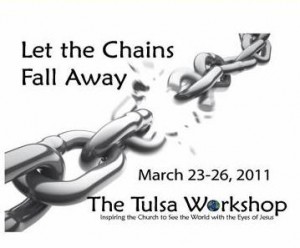
Recent Comments